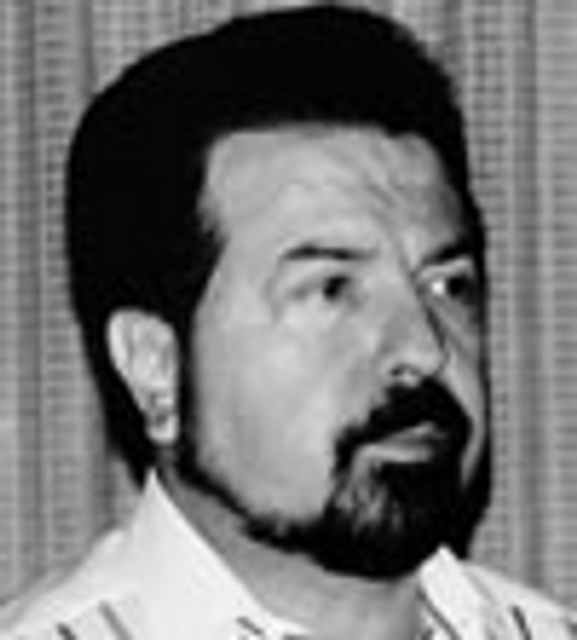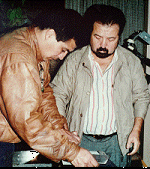Gilberto Rodríguez Orejuela

Gilberto Rodríguez Orejuela

Gilberto Rodríguez Orejuela | |
|---|---|
| Born | Gilberto José Rodríguez Orejuela (1939-01-30)January 30, 1939 Mariquita, Tolima, Colombia |
| Other names | "El Ajedrecista" (The Chess Player) "El Gino" |
| Criminal status | Imprisoned at FCC Butner |
| Conviction(s) | Conspiracy to import 5kg or more of cocaine. Conspiracy to engage in money laundering |
| Criminal penalty | 30 years (360 months) for conspiracy to import cocaine 7.25 years (87 months) for money laundering, sentences to run concurrently. Forfeiture of $2.1 billion in assets. |
Gilberto Rodríguez Orejuela | |
|---|---|
| Born | Gilberto José Rodríguez Orejuela (1939-01-30)January 30, 1939 Mariquita, Tolima, Colombia |
| Other names | "El Ajedrecista" (The Chess Player) "El Gino" |
| Criminal status | Imprisoned at FCC Butner |
| Conviction(s) | Conspiracy to import 5kg or more of cocaine. Conspiracy to engage in money laundering |
| Criminal penalty | 30 years (360 months) for conspiracy to import cocaine 7.25 years (87 months) for money laundering, sentences to run concurrently. Forfeiture of $2.1 billion in assets. |
Cali Cartel
Gilberto Rodríguez Orejuela, along with his brother Miguel Rodríguez Orejuela and José Santacruz Londoño, formed the Cali Cartel in the 1970s. They were initially primarily involved in marijuana trafficking. In the 1980s, they branched out into cocaine trafficking. For a time, the Cali Cartel supplied 80% of the United States through Rodriguez's son, Jorge Alberto Rodriguez, and 90% of the European cocaine market.
The Cali Cartel was less violent than its rival, the Medellín Cartel. While the Medellín Cartel was involved in a brutal campaign of violence against the Colombian government, the Cali Cartel grew. The later cartel was much more bribery rather than violence.
After the demise of Pablo Escobar, the Colombian authorities turned their attention to the Cali Cartel. The police campaign against the cartel began in the summer of 1995. President Samper dispatched a "joint task force" code named "Search Bloc", formed by top police and elite commandos headed by Police General Rosso José Serrano, declaring an all-out war against the drug cartels.
Capture
On June 9, 1995, Rodriguez Orejuela was arrested by the Colombian National Police (PNC) during a house raid in Cali. When the police had searched the home several days earlier, he had escaped detection by hiding in a hollowed-out bathroom cabinet with an oxygen tank.
Rodriguez Orejuela was sentenced to 15 years in prison. He was temporarily freed in early November 2002, due to a controversial judicial order issued by deputy judge Pedro José Suárez. He was recaptured by Colombian authorities in Cali, in March 2003. [4]
Extradition to the United States

Gilberto Rodríguez Orejuela processed after being captured
Gilberto Rodríguez Orejuela was extradited to the United States on December 3, 2004.[5] His brother Miguel was also arrested.
On September 26, 2006, both Gilberto and Miguel were sentenced to 30 years in prison, after pleading guilty to charges of conspiring to import cocaine to the U.S.[6] His extradition until today is considered illegal since it had been approved in 1997 while it was not for crimes that occurred before the enactment of the law. They took this deal in exchange for the United States agreeing not to bring charges against their family members. Their lawyers, David Oscar Markus and Roy Kahn, were able to obtain immunity for 29 family members.
On November 16, 2006, the brothers pleaded guilty to one count of conspiring to engage in money laundering. Both were sentenced to an additional 87 months in prison.[7] The two prison terms were set to run concurrently.
Gilberto Rodríguez Orejuela is serving his 30-year sentence at the Federal Correctional Institution, Butner, a medium-security facility in North Carolina.[8]
On March 5, 2018, a Colombian court sentenced eight relatives of the Rodriguez brothers to nine years in prison for laundering money that had been obtained during the Rodriguez brothers' time as heads of the Cali Cartel.[9] [10] Specifically, the court found that the family had used their legitimate businesses (including the pharmacy chain Drogas La Rebaja) to launder billions of pesos. These individuals had also shifted the money through various bank accounts in order to make it appear legitimate.
In popular culture
In 2010 Caracol TV Series El Cartel Rodríguez Orejuela is portrayed by the actor Hermes Camelo as the character of Leonardo Villegas.
In the 2012 Caracol TV series Escobar, el patrón del mal, Rodríguez Orejuela is portrayed by the actor Harold Devasten as the character of Gildardo Gonzalez
In the 2013 RCN TV series Tres Caínes, Rodríguez Orejuela is portrayed by Luis Enrique Roldán.
In the 2014 RCN TV series En la boca del lobo is portrayed by Sain Castro as the character of Edilberto Ramírez Orjuela.
See also
List of crime bosses convicted in the 21st century
Notable drug lords